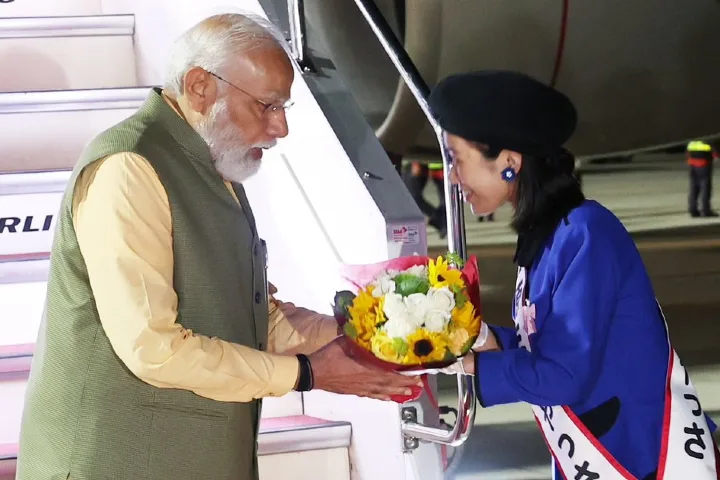

Prime Minister Narendra Modi lands in Japan (Image courtesy: Twitter: @narendramodi)
Prime Minister Narendra Modi, who is in Japan to attend the annual Group of Seven (G7) summit, is expected to raise the pitch for the Global South by prioritising issues relating to food, energy and climate change among others. Modi’s moves will be carefully watched especially as the world’s most powerful nations decide on thrashing out fresh sanctions on Russia.
In a statement, the G7 said that they were “imposing further sanctions and measures to increase the costs to Russia and those who are supporting its war effort.” The UK announced a ban on imports of diamonds and other metals which include copper, aluminum and nickel from Russia.
The countries are also likely to take steps to contain China’s aggressive moves. Amid rising geopolitical and geo-economic tensions, the summit, this time, is being carefully watched by world economies.
CNN said that as leaders of seven of the world’s most powerful democracies gather on Friday, it will be the authoritarian powers of China and Russia that dominate the agenda.
Interestingly India has maintained its strategic autonomy and continued to expand economic engagements with Russia.
India, which is now almost a regular guest at the G7 summits, will hold key. One, it currently holds the G20 presidency and two, New Delhi is being seen as the voice of the Global South, which has gained importance in the new world order.
In an interview to Nikkei Asia, Modi said that “he was looking forward to discussing global changes and challenges in areas such as energy, digital technology and supply chains.”
“I will emphasize India’s role as a reliable partner in addressing these challenges,” he told the news organisation.
Notably, most of the Global South nations have continued their political and economic engagements with Russia. The sanctions have actually pushed many of these countries including India and China to look at setting up alternative payment mechanisms to skirt the sanctions on Russia. India, which is already exploring a free trade agreement with Russia is now expanding its rupee trade not just with Moscow but with other nations as well.
The imminent expansion of the BRICS (Brazil-Russia-India-China-South Africa) block is also an indication of the shift in geopolitical dynamics. Public policy think tank, the American Security Project last year in its report said that “the possible addition of these countries to BRICS should concern the West as all are significant players in the global economy.” It underlined that countries in the “Global South are losing faith in the Western world order, as the US pays less and less attention to developing nations.”
In April Finance Minister Nirmala Sitharaman in Washington while attending the spring meetings of the World Bank and International Monetary Fund said that India will explore buying Russian crude oil near or past the price cap imposed by the G-7 nations to suit domestic interests. India imports more than 80 per cent of its total oil requirements.
In an interview with Bloomberg, she said. “Yes, because otherwise, I’ll end up paying far more than what I can afford. We have a large population and we also, therefore, have to look at prices which are going to be affordable for us,” she said.
The Global South looks at India
The dependence of the Global South nations on India to champion their cause has only increased in the last few years. As a functioning democracy, India’s soft power has only risen. Its actions stood out after it rushed to help bankrupt Sri Lanka and an earthquake hit Turkey. Besides Sri Lanka and Turkey, India has also offered its assistance to other countries. The rising power of India is evident from the fact that New Delhi has been regularly invited by the G2 since 2019.
“Modi, whose country currently holds the Group of 20 presidency, is set to attend the G-7 in Hiroshima at the personal invitation of Japanese Prime Minister Fumio Kishida. But the Indian leader has become a recurring guest – invited five straight times, including the 2020 summit that was cancelled due to Covid 19 and an only address in 2021. This underscores the importance advanced economies now place on the world’s largest democracy, which likely already surpassed China as the most populous country as well,” Nikkei Asia noted in another report.
Also read: In Mozambique, Jaishankar amplifies PM Modi’s pitch on Global South
Minister for Electronics and Information Technology Ashwini Vaishnaw said on Friday that the government is…
Renowned human rights activist and political analyst Amjad Ayub Mirza has expressed a strong denunciation…
As was widely expected, the Indian economy grew by 6.5 per cent in real terms…
World No Tobacco Day, marked annually on 31 May, addresses a major public health challenge--the…
Defence Minister Rajnath Singh, addressing officers and sailors onboard India's first indigenous aircraft carrier INS…
The leadership team from the Central Tibetan Administration (CTA) arrived in Tokyo to participate in…